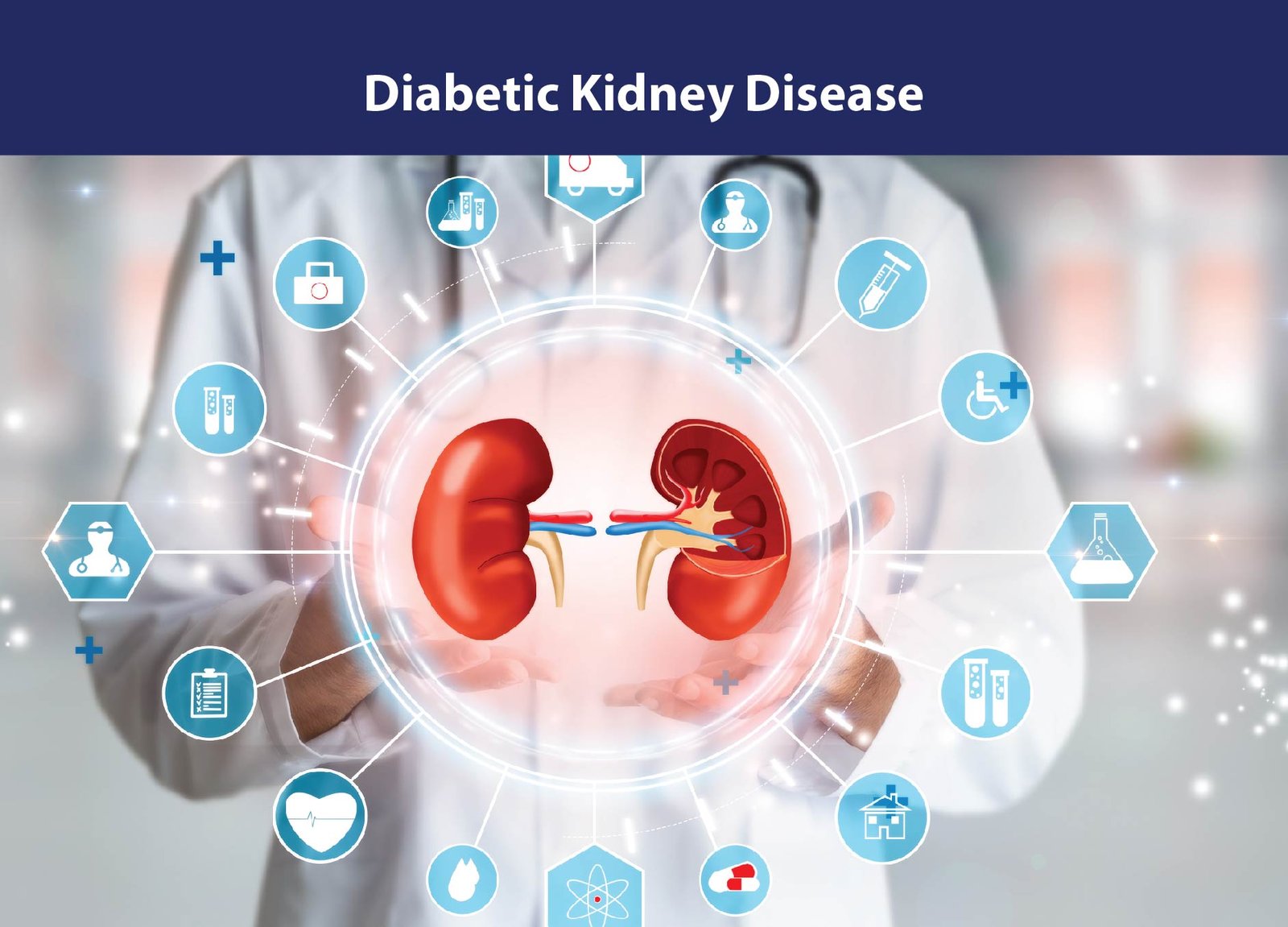Diabetes and Kidney Disease

Diabetes is a leading cause of kidney disease, often referred to as diabetic kidney disease (DKD) or diabetic nephropathy. High blood sugar levels over time can damage the kidneys’ filtering units (nephrons), leading to reduced kidney function and, in severe cases, kidney failure. Managing diabetes effectively is crucial to preventing or slowing the progression of kidney disease.
Diabetes is one of the leading causes of kidney disease, particularly diabetic kidney disease (DKD), also known as diabetic nephropathy. This condition develops when prolonged high blood sugar levels damage the delicate filtering units of the kidneys, known as nephrons. Over time, this damage can reduce kidney function, eventually leading to chronic kidney disease (CKD) and, in severe cases, end-stage renal disease (ESRD). Proper management of diabetes and regular monitoring of kidney health are critical to preventing or slowing the progression of kidney complications.
How Diabetes Affects Kidney Function
High Blood Sugar Levels:
- Elevated glucose levels in the blood damage the small blood vessels in the kidneys (glomeruli), impairing their ability to filter waste effectively.
Proteinuria:
- As kidney damage progresses, proteins, particularly albumin, leak into the urine, a hallmark of kidney dysfunction.
Hypertension:
- Diabetes often causes or exacerbates high blood pressure, which further damages the kidneys by increasing pressure on the blood vessels.
Chronic Inflammation:
- Persistent high blood sugar can lead to inflammation and scarring (fibrosis) in the kidney tissue.
Progressive Decline:
- Without intervention, kidney function gradually deteriorates, resulting in CKD and, eventually, ESRD.
Stages of Diabetic Kidney Disease
DKD progresses through the following stages:
Stage 1:
- Hyperfiltration with high glomerular filtration rate (GFR).
- No visible symptoms; early changes in kidney structure may occur.
Stage 2:
- Early structural damage and microalbuminuria (small amounts of protein in the urine).
Stage 3:
- Significant proteinuria and noticeable decline in GFR.
- Symptoms such as fatigue and mild swelling may appear.
Stage 4:
- Severe reduction in GFR, high levels of protein in urine, and noticeable symptoms of CKD.
Stage 5 (ESRD):
- Kidneys fail to filter blood effectively, requiring dialysis or a kidney transplant to sustain life.
Symptoms of Diabetic Kidney Disease
In the early stages, DKD is often asymptomatic. As the disease progresses, the following symptoms may appear:
- Swelling in the feet, ankles, hands, or face (edema).
- Increased frequency of urination, especially at night.
- Fatigue and weakness.
- Loss of appetite or nausea.
- Persistent itching.
- High blood pressure that is difficult to control.
- Foamy urine due to proteinuria.
Diagnosis
Urine Tests:
- Albumin-to-Creatinine Ratio (ACR): Measures protein levels in urine.
- Detects microalbuminuria and proteinuria.
Blood Tests:
- Evaluates creatinine levels and estimates GFR to assess kidney function.
Imaging Tests:
- Ultrasound or CT scans to check for structural changes in the kidneys.
Kidney Biopsy:
- Performed in certain cases to confirm DKD and rule out other kidney diseases.
Treatment and Management
Managing DKD requires a multidisciplinary approach to control diabetes, protect kidney function, and address associated complications.
1. Blood Sugar Control
- Medications: Insulin and oral hypoglycemic agents.
- Monitoring: Frequent blood sugar checks and regular HbA1c tests (target <7%).
- Diet: Low glycemic index foods and balanced carbohydrate intake.
2. Blood Pressure Management
- Target Levels: Less than 130/80 mmHg.
- Medications: ACE inhibitors (e.g., enalapril) or ARBs (e.g., losartan) to reduce proteinuria and protect kidney function.
3. Lifestyle Modifications
- Low-Sodium Diet: Reduces fluid retention and blood pressure.
- Physical Activity: Regular exercise to improve blood sugar control and cardiovascular health.
- Smoking Cessation: Smoking exacerbates kidney damage.
4. Cholesterol Management
- Use of statins (e.g., atorvastatin) to lower LDL cholesterol and reduce cardiovascular risks.
5. Advanced Therapies
- SGLT2 Inhibitors: Medications like empagliflozin and dapagliflozin that help control blood sugar and slow CKD progression.
- GLP-1 Receptor Agonists: May provide additional benefits in kidney protection.
6. Dialysis or Kidney Transplant
- Required in ESRD when the kidneys fail to function adequately.
Prevention of DKD
Optimal Diabetes Management:
- Maintain HbA1c levels below 7%.
- Regular glucose monitoring.
Regular Kidney Check-Ups:
- Annual screening for microalbuminuria and kidney function tests.
Blood Pressure Control:
- Consistently maintain within target range.
Healthy Lifestyle:
- Balanced diet, regular exercise, and avoiding tobacco and excessive alcohol.
Hydration:
- Drink adequate water unless restricted due to CKD.
